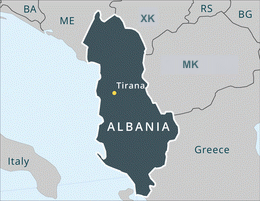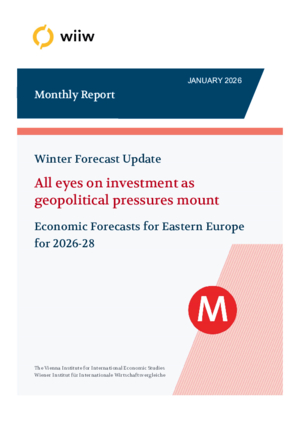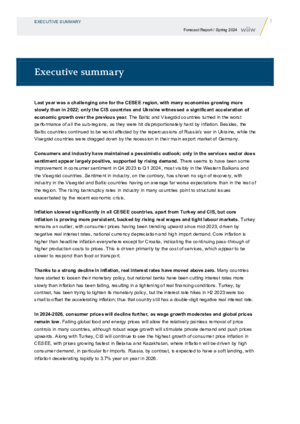Albania

| FORECAST* | ||||||
|---|---|---|---|---|---|---|
| Main Economic Indicators | 2023 | 2024 | 2025 | 2026 | 2027 | 2028 |
| Population, 1000 persons | 2410 | 2377 | . | . | . | . |
| GDP, real change in % | 4.0 | 4.0 | 3.7 | 3.8 | 3.9 | 3.7 |
| GDP per capita (EUR at PPP) | 15530 | 16750 | . | . | . | . |
| Gross industrial production, real change in % | -8.4 | -7.5 | . | . | . | . |
| Unemployment rate - LFS, in %, average | 10.7 | 8.5 | 8.4 | 8.3 | 8.2 | 8.1 |
| Average gross monthly wages, EUR | 648 | 769 | . | . | . | . |
| Consumer prices, % p.a. | 5.3 | 2.6 | 2.3 | 2.5 | 2.4 | 2.3 |
| Fiscal balance in % of GDP | -1.3 | -0.7 | -0.5 | -1.3 | -1.0 | -1.0 |
| Public debt in % of GDP | 57.6 | 54.2 | 52.0 | . | . | . |
| Current account in % of GDP | -1.2 | -2.4 | -3.0 | -3.1 | -3.2 | -3.5 |
| FDI inflow, EUR m | 1498 | 1581 | . | . | . | . |
| Gross external debt in % of GDP | 46.4 | 40.7 | 40.0 | . | . | . |
Basic data are continuously updated.
* Forecasts are changed beginning of January, April, July and November.
See Press Conferences.
Monthly Report No. 1/2026
Vasily Astrov, Alexandra Bykova, Selena Duraković, Meryem Gökten, Richard Grieveson, Maciej Grodzicki, Ioannis Gutzianas, Doris Hanzl-Weiss, Gabor Hunya, Branimir Jovanović, Biljana Jovanovikj, Niko Korpar, Dzmitry Kruk, Sebastian Leitner, Isilda Mara, Emilia Penkova-Pearson, Olga Pindyuk, Sandor Richter, Marko Sošić, Bernd Christoph Ströhm and Marina Tverdostup
wiiw Monthly Report No. 1, January 2026
58 pages including 6 Tables and 15 Figures
Executive summary
Olga Pindyuk
in: The Crisis is Over, but its Scarring Effects are Hindering Recovery
wiiw Forecast Report No. Spring 2024, April 2024 , pp. I-VII
Details

